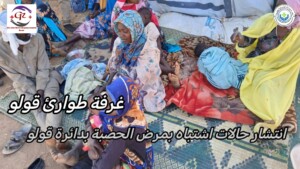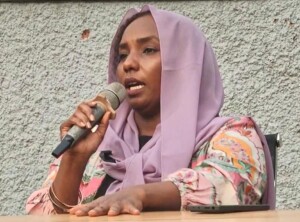Suspected cholera: Rate of new cases ‘stable’ in Central Darfur
The hospital in Nierteti and medical isolation centres in nearby villages continued to receive patients suffering from what is suspected to be cholera. In most of the isolation wards the numbers of infected people are slightly higher than earlier this week, or stable.
 A cholera isolation ward in eastern Jebel Marra (RD)
A cholera isolation ward in eastern Jebel Marra (RD)
The hospital in Nierteti and medical isolation centres in nearby villages continued to receive patients suffering from what is suspected to be cholera. In most of the isolation wards the numbers of infected people are slightly higher than earlier this week, or stable.
The isolation wards in Nierteti Hospital, Kuweila, Mara and Korifal villages in the eastern part of Central Darfur received 23 new cases on Thursday, according to a volunteer working in the medical sector. He said that the total number of cases has reached more than fifty patients.
The volunteer told Radio Dabanga that the centre in Kuweila received 12 new cases on Wednesday and Thursday. The number of people suffering from the disease and being treated in the ward was 39 on Thursday, meaning that the medics in the ward dismissed several people as 36 people were held there on Wednesday.
The isolation ward in Mara received five new cases on Thursday, bringing the total number held there from fourteen people on Wednesday to nineteen cases in total.
Numbers of patients remained stable in Korifal medical centres, as four people suffering from the disease were brought in on Thursday, amounting to twelve patients in total.
Yesterday Radio Dabanga reported that at Luwein village, nine new cases were recorded until Tuesday morning.
Nierteti Hospital decrease
The volunteer added that yesterday, the medical isolation centre in Nierteti Hospital witnessed a decrease in the number of cases it received. The hospital did not receive a single case that was suspected of being cholera during the day.
“Sudanese health authorities set-up a new isolation tent between Girni and Nierteti,” he reported.
Ministry to take measures
State Minister of Health Musa Mohamed Khatir said that families in the areas of Jebel Marra have to use donkeys to transport any infected people to the treatment centres because of a lack of transportation and rough roads.
He reported that there has been a decrease in the number of new cases of “acute watery diarrhoea” – a term the Sudanese authorities and several international organisations use for the disease of which the spread turned into epidemic proportions last year. Doctors and epidemiologists at the time independently confirmed the cases of “diarrhoea” to be cholera.
'School children in Central Darfur sitting for examinations will undergo medical examination.' – State minister of health
Khatir said in a press statement that his ministry had put in place “measures of precaution” in areas of the outbreak of the disease such as Golo, Rokoro and Guldo, in the western part of the Jebel Marra massive. “Chlorination of water, sanitation and awareness raising activities will continue in Jebel Marra even if the disease is eradicated.”
The state ministry will let basic school students in the affected areas, who will sit for school examinations soon, undergo medical examination. “We will chlorinate the water and spray toilets in their boarding houses.”
This week the undersecretary of the federal Ministry of Health, Esameldin Abdallah, also said that the spread of health teams in the villages and cities of Central Darfur has contributed to the decrease of cases. He did not say how many deaths and infections the ministry has monitored since the outbreak of the disease.
Follow #CholeraInSudan, #الكوليرا_السودان for ongoing coverage by Radio Dabanga











 and then
and then